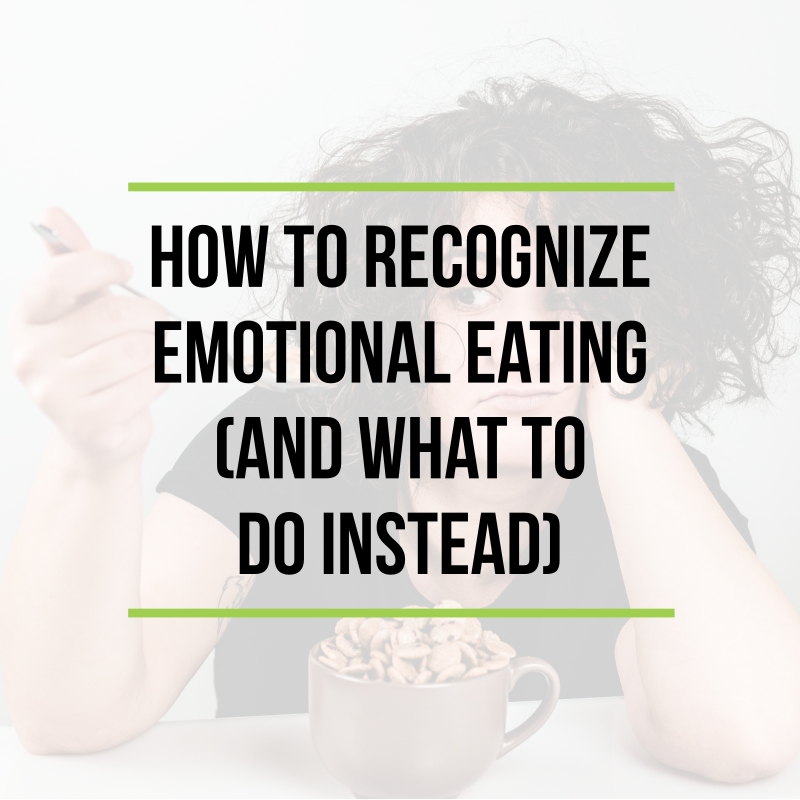Emotional eating is a very real behaviour that can affect our lives in a variety of ways. But it’s not always easy to tell if what we’re doing IS emotional eating. In this article, we’ll discuss what emotional eating is, how to recognize it, and what to do instead.
How to Recognize Emotional Eating (and What to Do Instead)
At the time of this writing, the world is still stuck in the middle of the COVID-19 pandemic.
I think we can all agree that this has been a very stressful and emotional time. We’ve all been experiencing a variety of emotions.
Fear.
Doubt.
Anxiety.
Grief.
Anger.
Confusion.
It’s led many of us to engage in behaviours as a form of escape… including emotional eating.
But what, exactly, is emotional eating?
What is Emotional Eating?
To put it simply, emotional eating is when you respond to certain types of emotions by eating. Makes sense, right? Our minds and bodies are very interconnected, so it makes sense that when we feel strong emotions, it can impact us on a physical level. For example, when you feel anxious, worried, depressed, or sad, frustrated, hopeless, overwhelmed, or tense, you may turn to things like food for a sense of comfort or escape (in a similar way that other people may turn to drugs, alcohol, or sex). It’s a way for us to cope with the things we are feeling and to exert some kind of control over our lives when other things seem beyond our control.
But, did you know that emotional eating doesn’t just happen when you’re feeling bombarded by NEGATIVE emotions? That’s right! In addition to eating as a response to negative emotions like anxiety, depression, and anger, we can also turn to food when we feel positive emotions (such as joy, happiness, or excitement) and even neutral emotions (like boredom). You can also engage in emotional eating when you’re feeling stressed – which can be due to negative things (like losing a job) or positive things (like starting a new job).
Another characteristic of emotional eating is that it often occurs in the absence of genuine hunger. In other words, you’re not eating to satisfy hunger – but something deeper.
Signs of Emotional Eating
Here are a few other common signs of emotional eating:
- You eat in response to certain emotions (annoyance, anger, loneliness, disappointment, sadness, frustration, etc).
- You eat when you’re stressed out, anxious, or overwhelmed.
- You eat when you feel tired or bored.
- You eat to feel happy (Note: This is different from feeling happy when you eat something you enjoy. I’m talking about eating specifically to evoke a feeling of happiness).
- You keep eating even though you no longer feel hungry or feel full.
- You have strong cravings (often for carbs, sweets, fatty foods, or foods you view as “comfort food”).
- You go out of your way to satiate your cravings – even if you have other options already on hand (for example, making late-night runs or ordering out).
- You give in to cravings on a regular basis (for example, grabbing fast food at the end of every workday even though you have healthier food at home).
- You feel guilty after you’ve eaten (because you spent money you shouldn’t have, knew you had healthier options, etc).
- You eat way more than you should or more than you normally would.
- You’re gaining weight because of the type and amount of food that you eat (Note: Weight gain is not always a sign of emotional eating, but it can be).
- You eat out of a sense of obligation. For example, you may eat when people around you are eating, even if you’re not hungry You may also have been raised to “finish your plate” even if you’re full.
What are the Negative Effects of Emotional Eating?
While you were reading through the signs mentioned above, did you feel triggered by any?
What’s wrong with enjoying food or the joy it can bring? Why is eating things that bring you comfort bad? What’s so abnormal about craving something you enjoy?
In reality, the things above aren’t all unhealthy in and of themselves. Sometimes you just want what you want… and that’s okay. The point when emotional eating becomes a problem is when it becomes a habit. And let’s be 100% honest with ourselves — we know when something is a habit.
It’s one thing to have cravings every once in a while that you happily indulge. It’s one thing to have cravings when you’re pregnant and your body is going through all kinds of hormonal changes. However, it’s something else when you go through this list and realize that you do these things on a weekly or daily basis. That is when you have a problem. Here are some of the unhealthy effects of emotional eating:
You create an unhealthy relationship with food
Food can bring us joy. It can make us do little happy dances. It can even bring people together. However, neither of those is the natural purpose of food. Food is (at its core) a source of energy and nutrients for our bodies. Period. It’s what our bodies need to be able to function. All other functions of food are ones that we attribute to it – especially emotional functions. When you develop an emotional relationship with food, you essentially create a personal belief system in which food serves as a coping mechanism. As with any relationship, when you have unrealistic expectations or an unhealthy dependency, things will eventually fall apart for you.
You never get to the root of your emotional triggers
Another big problem with emotional eating is that you often don’t get to the root of the emotion that drives you to eat – especially if that emotion is a negative one. In other words, food becomes a bandage for your problems, but what you need is to HEAL the problem instead of covering it up.
You never resolve the problems that drive you to eat.
Because you never really address the root of your emotional eating, those problems might never be resolved. So you get stuck in a cycle where the emotional trigger pops up, you temporarily escape from it by eating, and then (at some point) it pops up again. Rinse and repeat.
You develop even more problems because of your eating habits
Not only does emotional eating cause you to avoid your problems — it can also create new ones. Emotional eating (especially when combined with unhealthy foods or overeating) can lead to digestive issues. high cholesterol, high blood pressure, and weight gain. If left unchecked, this can lead to heart problems, obesity diabetes, and an array of other very serious medical conditions.
So, what can you do to put an end to emotional eating habits?
How to Stop Emotional Eating
Start a Food Journal
In order to figure out what your emotional triggers are, I highly recommend starting a food journal. Keep track of what you eat, how much you eat, and when you eat for a month. Also, whenever you eat, make a not of how you’re feeling or if something significant happened right before you ate or felt a craving. Over time, you will likely see a trend in what causes you to turn to food as a coping mechanism.
Find Other Coping Mechanisms
Once you’ve identified what your emotional triggers are that drive you to emotional eating, you can start replacing eating with another behaviour. For example, instead of eating you could go for a walk, do some yoga, draw, paint, dance around the house, clean, call a friend to hang out, play a game, write or journal, or any other activity that you enjoy and that can occupy your mind.
Remove Temptation
Another way to resist the temptation to turn to food as a coping mechanism is to remove the temptation or make it harder for you to give in to temptation. For example, if you tend to turn to sweets when you are upset, don’t keep sweets in your house. That means that in order to get sweets, you would have to leave the house and go somewhere to buy them. If you tend to order delivery when you’re upset, try blocking restaurant websites and ordering websites (like JustEat or UberEats) from your browser. You can also delete any numbers you have saved from your phone. Of course, doing these things won’t stop you from going out or ordering in, but they serve as an obstacle that you have to overcome to indulge your craving — and give you time to think about whether or not that is something you should do.
Get Support
I’d be lying if I said that this will be easy. breaking ANY habit is bound to be a challenge. But, if you have the right kind of support in your corner, it is that much more manageable. So enlist some supportive loved ones to help you stay on track with your goals. They can be people that you can call on whenever you feel like you’re going to give in to temptation. This support can also come in the form of an official support group or a counsellor/therapist who is trained to help people overcome food-related issues. A therapist, especially, can help you get to the root of your emotional eating triggers and help you to heal them.
Create a Plan
I can’t talk about healthy eating habits without talking about meal plans. It is really helpful if you have a plan for what you will eat throughout the day – including breakfast, lunch, dinner, snacks, and dessert. When you know exactly what you’re eating (and when) it can make it easier for you to hold off on indulging in between meals.
Stick to Your Plan
Of course, no plan is worth the paper it’s written on if you don’t follow it. So, be sure to actually implement and stick to your meal plan as best as you can. If you fall short and give in to temptation, don’t beat yourself up about it. Just move on to the next meal and go from there.
Eat Mindfully
Whenever you’re eating, do it mindfully. Think about what you’re eating. Savour each bite. Eat slowly and pay attention to your body so that you recognize when it’s telling you that it’s full. The more you eat mindfully, the less likely you are to overdo it or do it without needing to
I hope that this helps you to identify whether you’re an emotional eater and figure out a plan to develop a healthier relationship with food. As always, if you have any questions or want to hop on a chat to discuss your health needs, I’m only an email away. Reach out anytime at hypnoswellbeing@gmail.com and I’ll be in touch!


